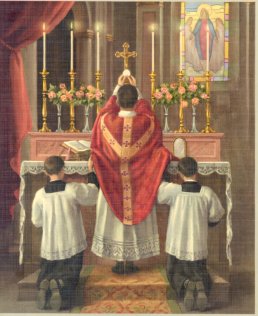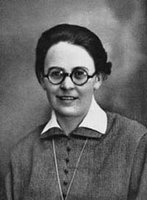
"If you love Me, keep My Commandments."
Nothing is so common among Christians as to say, "O my God; I love Thee," and nothing more rare, perhaps, than the love of the good God. Satisfied with making outward acts I of love, in which our poor heart often has no share, we think we have fulfilled the whole of the precept. An error, an illusion; for see, my children, Saint John says that we must not love the good God in word, but in deed. Our Lord Jesus Christ also says, "If anyone love Me he will keep My Word:' If we judge by this rule, there are very few Christians who truly love God, since there are so few who keep His Commandments. Yet nothing is more essential than the love of God. It is the first of all virtues, a virtue so necessary, that without it we shall never get to Heaven; and it is in order to love God that we are on the earth. Even if the good God did not command it, this feeling is so natural to us, that our heart should be drawn to it of its own accord.
But the misfortune is that we lavish our love upon objects unworthy of it, and refuse it to Him alone who deserves to be infinitely loved. Thus, my children, one person will love riches, another will love pleasures; and both will offer to the good God nothing but the languishing remains of a heart worn out in the service of the world. From thence comes insufficient love, divided love, which is for that very reason unworthy of the good God; for He alone, being infinitely above all created good, deserves that we should love Him above all things: more than our possessions, because they are earthly; more than our friends, because they are mortal; more than our life, because it is perishable; more than ourselves, because we belong to Him. Our love, my children, if it is true, must be without limit, and must influence our conduct....
If the Saviour of the world, addressing Himself to each one of us separately, were now to ask us the same question that He formerly asked Saint Peter: "Simon, son of John, lovest thou Me?" could we answer with as much confidence as that great Apostle, "Yea, Lord, Thou knowest that I love Thee"? Domine, tu scis quia amo te. We have perhaps pronounced these words without taking in their meaning and extent; for, my children, to love the good God is not merely to say with the mouth, "O my God! I love Thee!" Oh, no! where is the sinner who does not sometimes use this language?
To love the good God is not only to feel from time to time some emotions of tenderness towards God; this sensible devotion is not always in our own power. To love the good God is not to be faithful in fulfilling part of our duties and to neglect the rest. The good God will have no division: "Thou shalt love the Lord thy God with thy whole heart, and with thy whole soul, and with thy whole strength:' This shows the strength of the Commandment to love God. To love God with our whole heart is to prefer Him to everything, so as to be ready to lose all our possessions, our honour, our life, rather than offend this good Master. To love God with our whole heart is to love nothing that is incompatible with the love of God; it is to love nothing that can share our heart with the good God: it is to renounce all our passions, all our ill-regulated desires. Is it thus, my children, that we love the good God?
To love the good God with our whole mind is to make the sacrifice to Him of our knowledge and our reason, and to believe all that He has taught. To love the good God with our whole mind is to think of Him often, and to make it our principal study to know Him well. To love the good God with our whole strength is to employ our possessions, our health, and our talents, in serving Him and glorifying Him. It is to refer all our actions to Him, as our last end. Once more, is it thus that we love the good God? Judging by this invariable rule, how few Christians truly love God!
Do those bad Christians love the good God, who are the slaves of their passions? Do those worldly persons love the good God, who seek only to gratify their body and to please the world? Is God loved by the miser, who sacrifices Him for a vile gain? Is He loved by that voluptuary, who abandons himself to vices the most opposite to divine love? Is He loved by that man who thinks of nothing but wine and good cheer? Is He loved by that other man, who cherishes an aversion to his neighbour, and will not forgive him? Is He loved by that young girl, who loves nothing but pleasures, and thinks of nothing but indulgence and vanity? No, no, my children, none of these persons love the good God; for we must love Him with a love of preference, with an active love!
If we had rather offend the good God than deprive ourselves of a passing satisfaction, than renounce those guilty meetings, those shameful passions, we do not love the good God with a love of preference, since we love our pleasures, our passions, better than the good God Himself. Let us go down into our own souls; let us question our hearts, my children, and see if we do not love some creature more than the good God. We are permitted to love our relations, our possessions, our health, our reputation; but this love must be subordinate to the love we should have for God, so that we may be ready to make the sacrifice of it if He should require it....
Can you suppose that you are in these dispositions--you who look upon mortal sin as a trifle, who keep it quietly on your conscience for months, for years, though you know that you are in a state most displeasing to the good God? Can you suppose that you love the good God? Can you suppose that you love the good God--you who make no efforts to correct yourselves; you who will deprive yourselves of nothing; you who offend the Creator every time that you find opportunity? Yes, my children, what the miser loves with his whole heart is money; what the drunkard loves with his whole heart is wine; what the libertine loves with his whole heart is the object of his passion. You, young girls, you who had rather offend God than give up your finery and your vanities, you say that you love God; say rather that you love yourselves.
No, no, my children; it is not thus that the good God is to be loved, for we must love Him not only with a love of preference, but also with an active love. "Love," says Saint Augustine, "cannot remain without the constant action of the soul: Non potest vacare amor in anima amantis. Yes," says this great saint, "seek for a love that does not manifest itself in works, and you will find none:' What! could it be, O my God, that Thy love alone should be barren, and that the Divine fire, which ought to enkindle the whole world, should be without activity and without strength?
When you love a person, you show him the more or less affection according as the ardour of your love for him is more or less great. See, my children, what the saints were like, who were all filled with the love of the good God: nothing cost them too much; they joyfully made the greatest sacrifices; they distributed their goods to the poor, rendered services to their enemies, led a hard and penitential life; tore themselves from the pleasures of the world, from the conveniences of life, to bury themselves alive in solitude; they hastened to torments and to death, as people hasten to a feast. Such were the effects which the love of the good God produced in the saints; such ought it to produce in us. But, my children, we are not penetrated with the love of God; we do not love the good God. Can anyone say, indeed, that he loves the good God, who is so easily frightened, and who is repulsed by the least difficulty? Alas! what would have become of us if Jesus Christ had loved us only as we love Him? But, no. Triumphing over the agonies of the Cross, the bitterness of death, the shame of the most ignominious tortures, nothing costs Him too dear when He has to prove that He loves us. That is our only model. If our love is active, it will manifest itself by the works which are the effects of love, because the love of the good God is not only a love of preference, but a pious affection, a love of obedience, which makes us practice His Commandments; an active love, which makes us fulfil all the duties of a good Christian. Such is the love, my children, which God requires from us, to which He has so many titles, which He has purchased by so many benefits heaped upon us by His death for us upon the Cross. What happiness, my children, to love the good God! There is no joy, no happiness, no peace, in the heart of those who do not love the good God on earth. We desire Heaven, we aspire to it; but, that we may be sure to attain to it, let us begin to love the good God here below, in order to be able to love Him, to possess Him eternally in His holy Paradise.
Read more on St. John Vianney
















